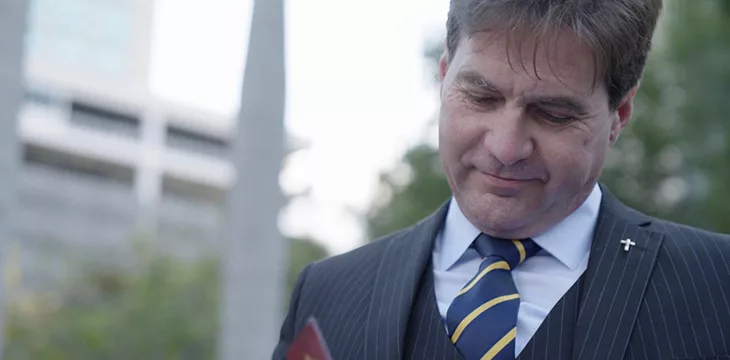COPA Crushes Craig Wright in Court
The narrative surrounding Craig Wright, who has claimed to be Satoshi Nakamoto, the pseudonymous creator of Bitcoin, is as complex as it is controversial. With a recent court ruling firmly stating that Wright is not the creator of Bitcoin, the focus has shifted to the broader implications of his claims, including questions over his academic credentials, work history and the potential for legal repercussions.
It’s safe to say that Wright has done everything he can to push the narrative (through the backing of former fugitive Calvin Ayre) that he is Satoshi Nakamoto. But now, with his name and reputation in tatters, where exactly does Craig Wright go from here?
The Court’s Verdict and Its Implications
The legal battle against the Crypto Open Patent Alliance (COPA) concluded with a judgment against Craig Wright, marking a significant blow to his claim of being Satoshi Nakamoto. The case raised substantial doubts about the authenticity of documents Wright presented, with some admissions from Wright himself about editing certain documents.
Labelling the evidence against Wright’s claims as “overwhelming”, it’s apparent that there is simply no legal route forward beyond this. Despite claiming on X that he will explore the avenues for appeal following the written judgement, the likelihood of an appeal moving forward is likely very slim.
This reality is that this case has not only tarnished his claim to Bitcoin’s creation, but has also raised questions about his integrity and the veracity of his assertions more broadly.

The Question of Fraud
Central to the controversies surrounding Craig Wright are allegations of fraudulent behavior. Critics argue that the inconsistencies in the documents he presented and his admission to backdating his supposed original version of the Bitcoin whitepaper are indicative of a pattern of deception. These allegations are compounded by Wright’s history of litigation, where his claims and evidence have often been scrutinized and challenged.
Throughout the case Wright faced serious allegations of fraud, with hundreds of documents submitted to the court found to be edited, backdated, and manipulated. COPA’s lawyers argued that this was “fraud on an industrial scale” and it is now clear that the judge in this case, Judge Mellor, agreed.
Academic Credentials and Work History
Further complicating Craig Wright’s public persona are the questions surrounding his academic credentials and work history. Given COPA’s claims that he was just an “IT security guy” and the deluge of former colleagues that had no interest in defending Wright’s credentials in court, it says a lot about Wright’s claims about being an expert in his field.
While Wright has claimed to hold several advanced degrees and has portrayed himself as a seasoned academic and professional, these claims have been met with vast skepticism. Verifying the authenticity of his educational achievements and the credibility of his professional experience has become a focal point for critics, especially in light of the recent legal findings.
In a recent X post from Frank Rundatz, he highlighted something that had long been suspected. It appears that Wright might have undertaken courses at the controversial Liberty University for reasons beyond just the ability for remote learning. Liberty University is a hotbed for questionable degrees (along with doubts lingering over both Grand Canyon University and The Open University, other institutions where Wright claims to have obtained degrees), with one particular service being highlighted – paying for someone to complete academic work on your behalf.
With the wealth of fraudulent accusations surrounding Wright, the idea that he has paid for someone to complete academic work on his behalf is not out of the question.

The Potential for Jail Time
One of the most severe potential consequences for Craig Wright stemming from the court’s decision is the possibility of facing jail time for perjury.
The court’s acknowledgment of forged documents and Wright’s admission to editing official documents raise legal and ethical issues that could have serious legal repercussions. If prosecutors decide to pursue charges for perjury, Wright could find himself in a protracted legal battle with significant personal stakes.
We know that COPA is pressing for this matter to referred to the Crown Prosecution Service in the United Kingdom, as a means for Wright’s perjury to be looked at under a criminal microscope. There is a every possibility that this will be explored, as Judge Mellor seemed to be particularly impacted by the fraud Wright brought upon the court.
What’s Next for Craig Wright?
In the aftermath of the court’s ruling, the path forward for Craig Wright is uncertain. The legal, professional, and public relations challenges he faces are daunting.
Restoring his credibility in the cryptocurrency community and beyond is impossible. His links to the BSV project by all accounts still exist, but whether BSV’ers would want Wright to return to the community in any capacity is probably up for debate.
Wright’s ability to influence the cryptocurrency discourse has been the driving force behind his claims, as in his own words he wanted to “destroy” the cryptocurrency sector and “kill” Satoshi Nakamoto. But, this ugly legal situation has undoubtedly left a lasting impact on the narrative surrounding him.
Lastly, Wright best be prepared for further legal scrutiny, especially if actions for perjury or other charges are pursued. Various memes of Wright sporting an orange jumpsuit have been doing rounds in recent weeks, but the jokes might not end up not being too far from the truth.

Questions Still Remain
Wright will be fortunate to escape criminal proceedings in the coming months, but one thing is sure above all else, his days in the cryptocurrency sphere are over. That being said, the complexities and controversies surrounding Craig Wright encapsulate a broader discussion about authenticity, integrity, and the mystique of Bitcoin’s origins. While the likes of Coindraw attempt to raise the bar for transparency in the space, there is no denying that there are other shady figures like Wright are still lurking in the blockchain sector.
As the cryptocurrency community moves forward, the lessons learned from Wright’s saga will likely influence how claims of invention, ownership, and contribution are viewed and verified in this still-evolving field.
